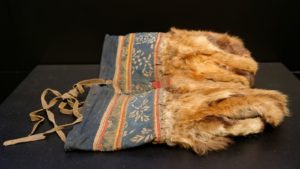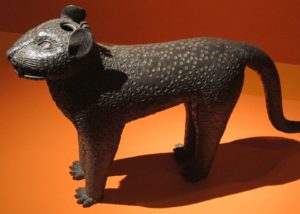Germany will invest as much as $2.17 million in a project to investigate how ethnographic and ancient objects from around the world that are now in German museums were acquired. The funds will be available to museums for provenance research, especially for investigating objects collected during the nineteenth and early twentieth century colonial period.
A number of Native American communities have had difficulty working with German institutions in the past. While the new program will focus primarily on investigation of ‘colonial’ objects, it may offer U.S. tribes opportunities for documenting both Native American human remains and important cultural objects and for eventually seeking their return.

Woman’s mittens made from red fox fur, indigo-dyed cotton canvas and leather. Orok people, Sakhalin island, Federation of Russia. Museum fur Volkerkunde, Dresden. Wikimedia Commons.
The funding program will be administered by the German Lost Art Foundation. Prior to this new program, the Foundation was tasked with investigating the provenance of cultural assets confiscated by the National Socialists through persecution, particularly from Jewish owners, and the loss of cultural assets during the period of Soviet occupation and the German Democratic Republic (GDR). In 2018, the Foundation received funding of 5.95 million EUR from the German federal government along with additional funding from Saxony-Anhalt.
The German Lost Art Foundation website and factsheet describes its role as primarily dedicated to giving grants for provenance research and registering search requests and reports on objects that have been found in its Lost Art Database. While the goals of the newly funded project will be different, focused on restitution to states rather than to individual or community owners, the process of delivering funding based on grant requests from researchers will remain essentially the same. In the context of its new remit to research provenance of ethnographic materials, the Foundation will continue to “support public museums, libraries, archives and research institutions to clarify the origin of ethnographic objects in their collections.”

Karl May Museum Radebeul, Werbung auf dem Dresdner Stadtfest 2012, photo by Paulae, Wikimedia Commons.
The first grant deadline for project proposals is June 1, 2019. The foundation has published a Guideline for the Funding of Provenance Research Projects on Collections from Colonial Contexts, 2019/01/01.
Priority will be given to projects involving collections of:
- Human remains
- Culturally sensitive objects
- Objects from former German colonies
- Objects associated with a violent colonial context
- Types of objects for which claims have already been made in Germany or in other countries or to which particular importance is attached in their countries and communities of origin
- Significant exhibited objects
- Objects related to local figures and local history at the applicant’s location
- Objects in respect of which close contact has already been established with experts and representatives from the countries and communities of origin

Benin bronze leopard, eighteenth century, Leipzig Museum of Ethnography, Photo by Salika. Wikimedia Commons.
The $2.17 million for the new program will be administered by the Foundation with the guidance of an eight member advisory board that will include Bénédicte Savoy, one of the co-authors of the report, The Restitution of African Cultural Heritage. Toward a New Relational Ethics, which was delivered to President Macron of France last year. Other members of the advisory board are Prof. Wiebke Ahrndt (Übersee-Museum Bremen), Prof. Antoinette Dominicé (Ludwig-Maximilians-Universität München), Prof. Albert Gouaffo (Université de Dschang, Cameroon), Prof. Monica Juneja (University of Heidelberg), Prof. Ulrike Lindner (University of Cologne), Dr. Barbara Plankensteiner (Museum am Rothenbaum, Hamburg), Prof. Bénédicte Savoy (Technische Universität Berlin), Maja Schweitzer (BKM, Berlin) and Dr. Stephanie Tasch (Cultural Foundation of the German Federal States, Berlin).

The Damascus room. Detail of painted and carved wood. The art collector Karl Ernst Osthaus (1874–1921) purchased the room in Damascus in 1899, Museum für Völkerkunde Dresden.
A short list of some of Germany’s important ethnographic collections includes:
- The Museum Five Continents (Museum Fünf Kontinente) in Munich, Germany, holds 200,000 objects.
- The Dresden Museum of Ethnology (Museum für Völkerkunde Dresden) holds more than 90,000 objects.
- The Leipzig Museum of Ethnography (Museum für Völkerkunde zu Leipzig) holds 200,000 objects.
- The Museum of World Cultures (Museum der Weltkulturen) in Frankfurt, Germany holds 65,000 objects.
- The Sammlung für Völkerkunde (Ethnological Collection) at the Institute of Cultural and Social Anthropology of the University of Göttingen, has 17,000 objects.
 Spirit bearer: bear spirit with an anthropomorphic face. Nivkh people, Amur river basin, Federation of Russia. Museum fur Volkerkunde, Dresden. Wikimedia Commons.
Spirit bearer: bear spirit with an anthropomorphic face. Nivkh people, Amur river basin, Federation of Russia. Museum fur Volkerkunde, Dresden. Wikimedia Commons. 

